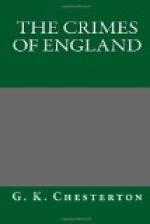The prestige of Cobbett’s excellent literary style has survived the persecution of his equally excellent opinions. But that style also is underrated through the loss of the real English tradition. More cautious schools have missed the fact that the very genius of the English tongue tends not only to vigour, but specially to violence. The Englishman of the leading articles is calm, moderate, and restrained; but then the Englishman of the leading articles is a Prussian. The mere English consonants are full of Cobbett. Dr. Johnson was our great man of letters when he said “stinks,” not when he said “putrefaction.” Take some common phrase like “raining cats and dogs,” and note not only the extravagance of imagery (though that is very Shakespearean), but a jagged energy in the very spelling. Say “chats” and “chiens” and it is not the same. Perhaps the old national genius has survived the urban enslavement most spiritedly in our comic songs, admired by all men of travel and continental culture, by Mr. George Moore as by Mr. Belloc. One (to which I am much attached) had a chorus—
“O wind from the South
Blow mud in the mouth
Of Jane, Jane, Jane.”
Note, again, not only the tremendous vision of clinging soils carried skywards in the tornado, but also the suitability of the mere sounds. Say “bone” and “bouche” for mud and mouth and it is not the same. Cobbett was a wind from the South; and if he occasionally seemed to stop his enemies’ mouths with mud, it was the real soil of South England.




